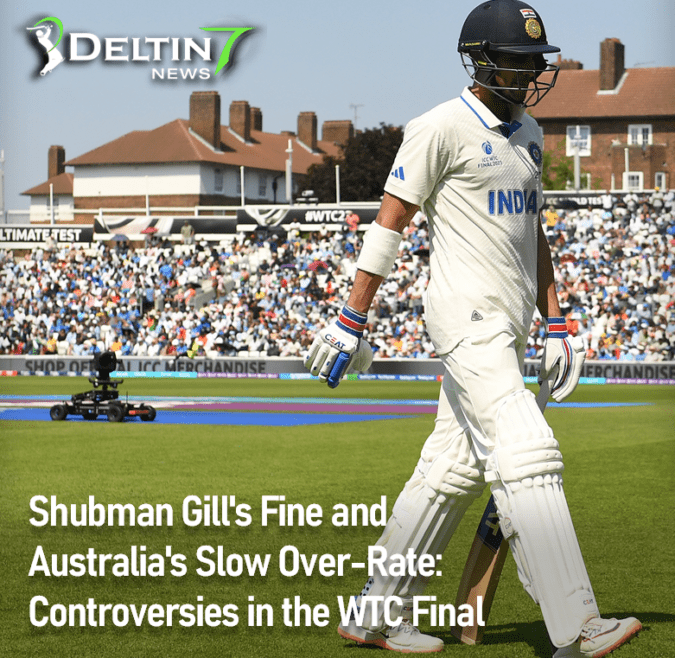
Shubman Gill’s Fine and Australia’s Slow Over-Rate: Controversies in the WTC Final
In a recent development, Shubman Gill, the talented Indian cricketer, has been fined 15 percent of his match fee for criticizing the TV umpire’s decision in the highly anticipated World Test Championship (WTC) final against Australia.
This incident has caused quite a stir in the cricketing world, as Gill’s comments have been deemed as a breach of Article 2.7, which pertains to “public criticism or inappropriate comment in relation to an incident occurring in an international match.”
Additionally, India has been slapped with a fine, while Australia has also faced sanctions for maintaining a slow over-rate. Let’s delve deeper into these controversies and the events that unfolded during the match.
The Catch Controversy: Gill’s Dismissal Raises Eyebrows
During India’s pursuit of a daunting target of 444 in the second innings, Shubman Gill found himself facing a crucial moment when he edged a delivery from Scott Boland towards gully. The catch was taken by Cameron Green, who dived low to his left to snatch the ball just inches above the ground.
However, Gill hesitated to walk off the field immediately, which prompted the on-field umpires to refer the decision to the TV umpire, Richard Kettleborough, without providing a soft signal as per the new protocol.
Kettleborough meticulously reviewed the replay from multiple angles before eventually ruling Gill out. This decision did not sit well with Gill, who took to social media to express his discontent. The young cricketer posted a screenshot of a zoomed front-on photo of Green taking the catch, accompanied by a couple of magnifying glass emojis and a facepalm emoji. Gill further voiced his opinion on Instagram, sharing a story with emojis of clapping hands.
The ICC acted swiftly and charged Gill with a breach of Article 2.7, resulting in a 15 percent fine on his match fee. Gill accepted the penalty, eliminating the need for a formal hearing. While emotions run high during intense matches, players must exercise caution when publicly criticizing umpiring decisions to maintain the spirit of the game.
Slow Over-Rates: Fines Imposed on India and Australia
Apart from the Gill controversy, the WTC final witnessed another contentious issue – slow over-rates. Both teams were found guilty of maintaining a slow pace of play, leading to financial penalties. India fell short by five overs, while Australia lagged behind by four overs, considering the time allowances.
As a consequence, India was fined their entire match fee, signaling the severity of their slow over-rate. On the other hand, Australia faced an 80 percent deduction of their fees. Such penalties highlight the importance of maintaining an acceptable over-rate, ensuring that matches progress smoothly and adhere to the stipulated timeframes.
Rohit Sharma’s Disappointment: Captain’s Take on Gill’s Dismissal
At the post-match press conference, Indian captain Rohit Sharma expressed his disappointment with the process followed to rule Shubman Gill out. Sharma believed that the third umpire should have examined the replays more thoroughly and gained a clearer understanding of how the catch was taken. He emphasized the need for proper and transparent information, not limited to the specific catch incident but extending to all aspects of the game.
Sharma’s comments shed light on the broader implications of decision-making in cricket and the importance of ensuring accurate judgments through rigorous examination of available evidence. The captain’s disappointment resonated with many fans and experts, raising discussions on the effectiveness of the umpiring review system and the role of technology in resolving on-field disputes.
Conclusion
The WTC final between India and Australia not only showcased a battle between two cricketing giants but also brought to the forefront controversies surrounding Shubman Gill’s criticism of the TV umpire’s decision and the slow over-rates maintained by both teams.
Gill’s fine and the sanctions imposed on India and Australia serve as reminders that players and teams must adhere to the established rules and protocols of the game. As cricket continues to evolve, it becomes imperative to strike a balance between technological advancements and maintaining the integrity and fairness of the sport.














